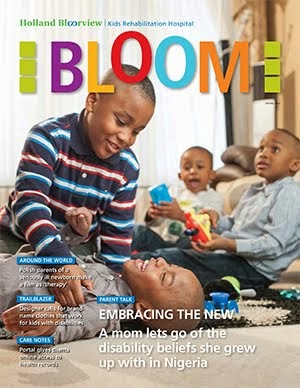Two parents shared their perspectives on partnering with professionals to support quality and safety in children's rehab and acute-care at a grand rounds at Holland Bloorview on Wednesday.
Here are a few key messages I took away from this fascinating talk.
Ann Hovey, with daughter Cailyn above who was diagnosed with a terminal brain-stem tumour six years ago (and sat in the audience to hear her mom speak!), spoke about how health-care professionals "are the gatekeepers for developing partnerships. They can work with us to develop our skill sets and dictate whether we become strong partners."
Through their actions, professionals create environments that support or impede parent collaboration and empowerment, she said. "The times when I felt most helpless were not necessarily the most dramatic medically. They were when I was least respected as an important contributor on Cailyn's health-care team, when I was least heard, and when my suggestions were least valued, leading me to feel least hopeful."
She shared a story about her inability to ask for an experienced specialist to perform a life-threatening procedure on her daughter when she didn't feel the neurosurgery resident on hand was up to the task. "In my professional life, I facilitated dysfunctional teams of people who didn't want to work together to exceed expectations, but I couldn't manage this incident with a resident. I felt too vulnerable and overwhelmed by the gravity of the information."
Ann talked about how parents arrive in the system "in ultimate vulnerability" and typically with a history of deferring responsibility for their own health-care decisions to doctors. Some of her strategies for building partnership with parents include: "Listen to parents; teach us how to help our children and support our reasonable choices; involve us in decision-making and give us the confidence that we have something to contribute; ask if we have questions and confirm our understanding on key issues; and stay seated, which means that you are here until we're comfortable with the information."
Heather Evans, the parent of two children who receive services at Holland Bloorview and co-chair of our family advisory, echoed Ann's point about how hard it is for an inexperienced parent to stand up and voice concerns with a medical professional. She described how she knew intuitively that her infant daughter Emma was not meeting her milestones, but her pediatrician dismissed her concerns with a curt: "Go home, everything's fine, and come back in three months."
Heather tried to initiate a discussion about her daughter's development by saying: "You do know she's a preemie, right?" but the doctor never followed up.
Her advice to clinicians who want true partnership with parents? "Listen to understand; have empathy; validate my concerns; and work together to develop a plan."
"All of this may seem like more than you bargained for when you joined your health-care profession," Heather said. "But having a child with a disability is generally more than any parent has bargained for as well."

























2 comments:
Such terrific advice. There's quite a movement here in the U.S. for parent/patient-centered care. I have been working for years part time as a parent advocate, helping parents to advocate for themselves and nudging the professionals to look on parents as equal partners. It's slow going, but with folks like you, it seems hopeful!
Sounds like a great conference. As a parent of a child with a disability and a RN who works with children with developmental disabilities I see often how health care providors preconceived notions narrow their ability to actively listen to parents and their concerns.
Parents know their children best and know when to be concerned. Too often health care providors don't stop to listen to what the families concerns are as they are busy planning interventions for what they see to be the problem.
Stereotyping parents is the greatest wrong for health care providors as it narrows their thinking and impairs their ability to actively listen to the core message parents are trying to relay.
Being stereotyped as the nervous mother has led to very poor judgement in my daughter's care. My 'nervous first time pregnancy' led the OB to disregard my concerns about pre-term labour and my daughter was born at 25 weeks. My concerns about my daughter's delayed development was brushed off as the I was 'anxious preemie parent' this was when at 30 months she was not walking. That HCP providor even had the audacity to kick us out of his clinic as I obtained and second opinion regarding her physical delays. I won't even begin to discuss the fights we have had in ER's trying to get HCP's to listen and provide adequate efficient care.
If a parents concerns were validated early on appropropriate action could be taken and children can begin to receive the early intervention they desparately need.
Sorry for my rambling but is something that needs to be taught in all schools pertaining to health care. PARENTS KNOW THEIR CHILDREN BEST.
Post a Comment